Hyundai i20 vs VW ID.3 – Performance, range & efficiency compared
Two cars, one duel: Hyundai i20 meets VW ID.3.
Which one wins in performance, efficiency and value for money? Find out now!
Costs and Efficiency:
Looking at overall running costs, both models reveal some interesting differences in everyday economy.
Hyundai i20 has a convincingly advantage in terms of price – it starts at 17400 £, while the VW ID.3 costs 28600 £. That’s a price difference of around 11168 £.
Engine and Performance:
Power, torque and acceleration are the classic benchmarks for car enthusiasts – and here, some clear differences start to show.
When it comes to engine power, the VW ID.3 has a decisively edge – offering 326 HP compared to 100 HP. That’s roughly 226 HP more horsepower.
In acceleration from 0 to 100 km/h, the VW ID.3 is decisively quicker – completing the sprint in 5.70 s, while the Hyundai i20 takes 11.10 s. That’s about 5.40 s faster.
In terms of top speed, the VW ID.3 performs slight better – reaching 200 km/h, while the Hyundai i20 tops out at 183 km/h. The difference is around 17 km/h.
There’s also a difference in torque: VW ID.3 pulls convincingly stronger with 545 Nm compared to 200 Nm. That’s about 345 Nm difference.
Space and Everyday Use:
Beyond pure performance, interior space and usability matter most in daily life. This is where you see which car is more practical and versatile.
Both vehicles offer seating for 5 people.
In curb weight, Hyundai i20 is clearly lighter – 1088 kg compared to 1787 kg. The difference is around 699 kg.
In terms of boot space, the VW ID.3 offers slight more room – 385 L compared to 352 L. That’s a difference of about 33 L.
In maximum load capacity, the VW ID.3 performs barely noticeable better – up to 1267 L, which is about 102 L more than the Hyundai i20.
When it comes to payload, VW ID.3 hardly perceptible takes the win – 473 kg compared to 472 kg. That’s a difference of about 1 kg.
Who comes out on top?
Overall, the VW ID.3 shows itself to be wins the duel decisively and secures the title of DriveDuel Champion.
It convinces with the more balanced overall package and proves to be the more versatile choice for everyday use.
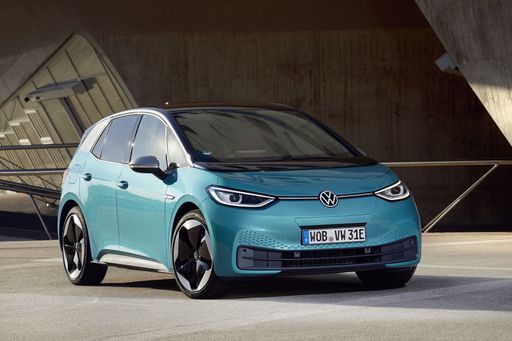
VW ID.3
Hyundai i20
The Hyundai i20 impresses with its sleek design and modern aesthetics, making it a stylish choice in the compact car segment. Its interior is thoughtfully designed, offering comfort and advanced technology for a pleasurable driving experience. The vehicle also stands out with its efficient performance and agile handling, making city driving a breeze.
details @ hyundai.news
@ hyundai.news
 @ hyundai.news
@ hyundai.news
 @ hyundai.news
@ hyundai.news
 @ hyundai.news
@ hyundai.news
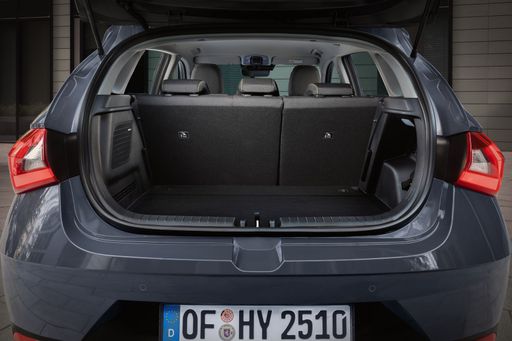 @ hyundai.news
@ hyundai.news
VW ID.3
The VW ID.3 represents Volkswagen's entry into the world of electric vehicles, offering a modern design that combines functionality with sustainability. Inside, you'll find a spacious and tech-forward interior, providing a comfortable driving experience while maintaining a focus on environmentally friendly materials. The ID.3's performance delivers a smooth and responsive feel on the road, making it a strong contender in the growing electric car market.
details @ Volkswagen
@ Volkswagen
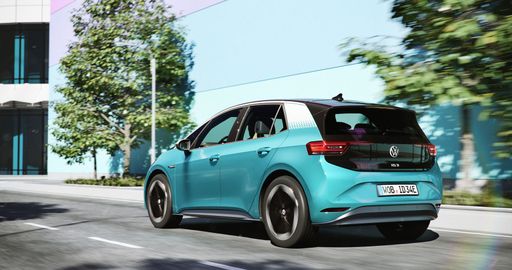 @ Volkswagen
@ Volkswagen
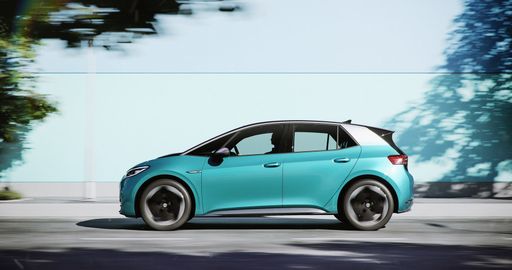 @ Volkswagen
@ Volkswagen
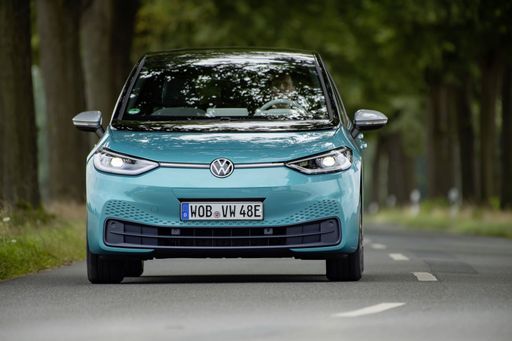 @ Volkswagen
@ Volkswagen
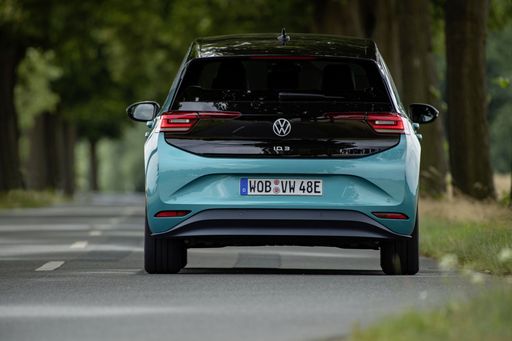 @ Volkswagen
@ Volkswagen
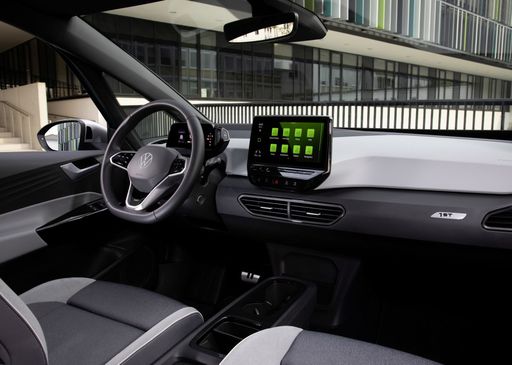 @ Volkswagen
@ Volkswagen
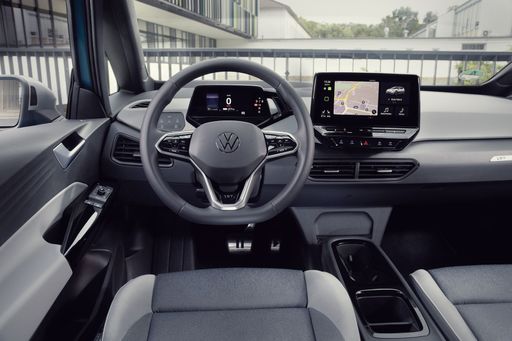 @ Volkswagen
@ Volkswagen

|

|
|
|
|
Costs and Consumption |
|
|---|---|
|
Price
17400 - 24000 £
|
Price
28600 - 49300 £
|
|
Consumption L/100km
5.2 - 5.3 L
|
Consumption L/100km
-
|
|
Consumption kWh/100km
-
|
Consumption kWh/100km
14.5 - 15.8 kWh
|
|
Electric Range
-
|
Electric Range
383 - 605 km
|
|
Battery Capacity
-
|
Battery Capacity
52 - 79 kWh
|
|
co2
119 - 121 g/km
|
co2
0 g/km
|
|
Fuel tank capacity
40 L
|
Fuel tank capacity
-
|
Dimensions and Body |
|
|---|---|
|
Body Type
Hatchback
|
Body Type
Hatchback
|
|
Seats
5
|
Seats
5
|
|
Doors
5
|
Doors
5
|
|
Curb weight
1088 - 1190 kg
|
Curb weight
1787 - 1993 kg
|
|
Trunk capacity
352 L
|
Trunk capacity
385 L
|
|
Length
4065 - 4075 mm
|
Length
4264 mm
|
|
Width
1775 mm
|
Width
1809 mm
|
|
Height
1450 - 1455 mm
|
Height
1564 mm
|
|
Max trunk capacity
1165 L
|
Max trunk capacity
1267 L
|
|
Payload
450 - 472 kg
|
Payload
437 - 473 kg
|
Engine and Performance |
|
|---|---|
|
Engine Type
Petrol
|
Engine Type
Electric
|
|
Transmission
Automatic, Manuel
|
Transmission
Automatic
|
|
Transmission Detail
Dual-Clutch Automatic, Manual Gearbox
|
Transmission Detail
Reduction Gearbox
|
|
Drive Type
Front-Wheel Drive
|
Drive Type
Rear-Wheel Drive
|
|
Power HP
79 - 100 HP
|
Power HP
170 - 326 HP
|
|
Acceleration 0-100km/h
11.1 - 13.7 s
|
Acceleration 0-100km/h
5.7 - 8.2 s
|
|
Max Speed
166 - 183 km/h
|
Max Speed
160 - 200 km/h
|
|
Torque
113 - 200 Nm
|
Torque
310 - 545 Nm
|
|
Number of Cylinders
3 - 4
|
Number of Cylinders
-
|
|
Power kW
58 - 74 kW
|
Power kW
125 - 240 kW
|
|
Engine capacity
998 - 1197 cm3
|
Engine capacity
-
|
General |
|
|---|---|
|
Model Year
2024
|
Model Year
2024 - 2025
|
|
CO2 Efficiency Class
D
|
CO2 Efficiency Class
A
|
|
Brand
Hyundai
|
Brand
VW
|
What drivetrain options does the Hyundai i20 have?
The Hyundai i20 is offered with Front-Wheel Drive.
The prices and data displayed are estimates based on German list prices and may vary by country. This information is not legally binding.
